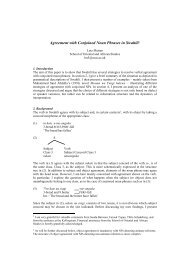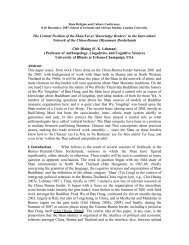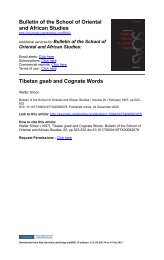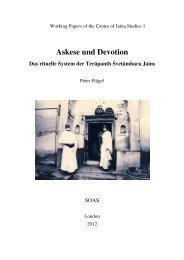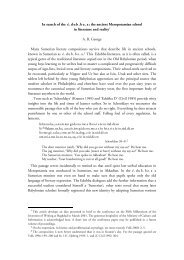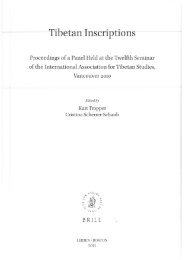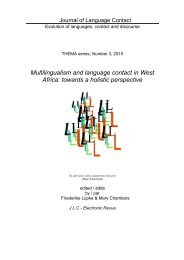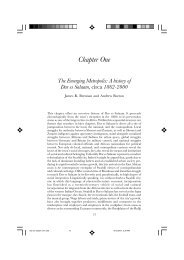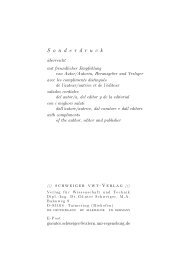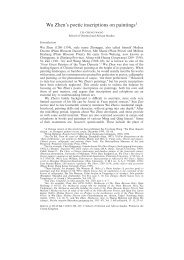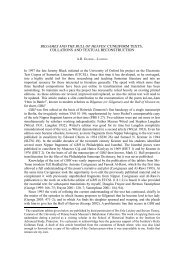Download (549Kb) - SOAS Research Online
Download (549Kb) - SOAS Research Online
Download (549Kb) - SOAS Research Online
You also want an ePaper? Increase the reach of your titles
YUMPU automatically turns print PDFs into web optimized ePapers that Google loves.
86 Warfare and Poetry in the Middle East<br />
Hittite narratives, like the tale of Zalpa, and suits well a style that uses<br />
frequent direct speech.<br />
The social function of such poetry, which unlike traditional epic does<br />
not seek to glorify the deeds of its protagonists, but to expose them to ridicule,<br />
clearly lies in reinforcing the superiority of the king over and above his<br />
subordinate nobles. 43 Unfortunately the poor state of preservation of this<br />
intriguing tablet, its beginning and end are missing, prevents our having<br />
anything but a speculative idea of how the story was intended to play out.<br />
Possibly the king himself sallied forth from his command centre and saved<br />
the day. One might assume that the campaign against Uršu was a great<br />
success otherwise the Hittites would hardly have been laughing about it.<br />
Another somewhat obscure military narrative is generally held to<br />
concern the crossing of the Taurus Mountains, the opening of the way<br />
into Syria by Hattusili I in the seventeenth century bc, and also contains<br />
two songs. 44 The narrator is Puhanu, the ‘servant of Sarmassu’, who is not<br />
otherwise known from Hittite documents. He appears to be narrating the<br />
actions of someone else, whose identity is not entirely clear. Suggestions<br />
range from the Hittite king to an enemy of the king, the storm-god of<br />
Aleppo or one of his supporters, whose help Puhanu may be advising the<br />
Hittite nobles to ask for in the Syrian campaign. 45 The following interpretation<br />
largely follows that of Gilan 2004, with the text largely based on<br />
Soysal 1987.<br />
KUB 31.4+KBo 3.41 46<br />
1. [UMM]A Pu!"nu ÌR Sarmassu .... antuwahhas=si<br />
2. [TÚG.G]Ú.È.A DAR.A w#sta || !arsani[=ssi] pattar ki[t]ta<br />
3. [GIŠ.B]AN-ZU !arzi || nu uw"rra !alzais || kuit iyanun kuit<br />
Thus Puhanu the servant of Sarmassu ... (a man to him ...)<br />
A colourful shirt he wears, on his head there is placed a basket<br />
He has his bow and he has called out for help, ‘what have I done, what?<br />
4. natta=sta kuitki || kuedanikka da!!un<br />
GUD-n=asta natta || (5) kuedanikka d"!!un<br />
UDU-n=asta natta || kuedanikka d"!!un<br />
6. ÌR [ME]Š? -n=asta GÉME-san || natta kuelka da!!un<br />
‘I have not taken anything from anyone,<br />
not an ox have I taken from anyone,<br />
not a sheep have I taken from anyone,<br />
not anyone’s male servants, (or) his female servant have I taken.<br />
03_Warfare&Poetry_Ch3_073-098.indd 86 06/02/2013 10:15



